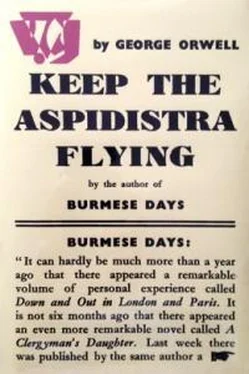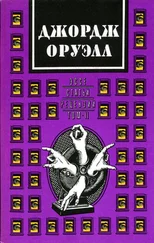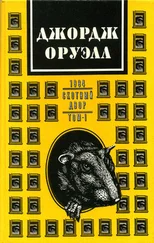But now, of course, there was no job to be had. For months he lived by cadging on the family. Julia kept him going till the last penny of her tiny savings was gone. It was abominable. Here was the outcome of all his fine attitudes! He had renounced ambition, made war on money, and all it led to was cadging from his sister! And Julia, he knew, felt his failure far more than she felt the loss of her savings. She had had such hopes of Gordon. He alone of all the Comstocks had had it in him to 'succeed'. Even now she believed that somehow, some day, he was going to retrieve the family fortunes. He was so 'clever'—surely he could make money if he tried! For two whole months Gordon stayed with Aunt Angela in her little house at Highgate—poor, faded, mummified Aunt Angela, who even for herself had barely enough to eat. All this time he searched desperately for work. Uncle Walter could not help him. His influence in the business world, never large, was now practically nil. At last, however, in a quite unexpected way, the luck turned. A friend of a friend of Julia's employer's brother managed to get Gordon a job in the accounts department of the New Albion Publicity Company.
The New Albion was one of those publicity firms which have sprung up everywhere since the War—the fungi, as you might say, that sprout from a decaying capitalism. It was a smallish rising firm and took every class of publicity it could get. It designed a certain number of large–scale posters for oatmeal stout, self– raising flour, and so forth, but its main line was millinery and cosmetic advertisements in the women's illustrated papers, besides minor ads in twopenny weeklies, such as Whiterose Pills for Female Disorders, Your Horoscope Cast by Professor Raratongo, The Seven Secrets of Venus, New Hope for the Ruptured, Earn Five Pounds a Week in your Spare Time, and Cyprolax Hair Lotion Banishes all Unpleasant Intruders. There was a large staff of commercial artists, of course. It was here that Gordon first made the acquaintance of Rosemary. She was in the 'studio' and helped to design fashion plates. It was a long time before he actually spoke to her. At first he knew her merely as a remote personage, small, dark, with swift movements, distinctly attractive but rather intimidating. When they passed one another in the corridors she eyed him ironically, as though she knew all about him and considered him a bit of a joke; nevertheless she seemed to look at him a little oftener than was necessary. He had nothing to do with her side of the business. He was in the accounts department, a mere clerk on three quid a week.
The interesting thing about the New Albion was that it was so completely modern in spirit. There was hardly a soul in the firm who was not perfectly well aware that publicity—advertising—is the dirtiest ramp that capitalism has yet produced. In the red lead firm there had still lingered certain notions of commercial honour and usefulness. But such things would have been laughed at in the New Albion. Most of the employees were the hard–boiled, Americanized, go–getting type to whom nothing in the world is sacred, except money. They had their cynical code worked out. The public are swine; advertising is the rattling of a stick inside a swill–bucket. And yet beneath their cynicism there was the final naivete, the blind worship of the money–god. Gordon studied them unobtrusively. As before, he did his work passably well and his fellow–employees looked down on him. Nothing had changed in his inner mind. He still despised and repudiated the money–code. Somehow, sooner or later, he was going to escape from it; even now, after his first fiasco, he still plotted to escape. He was IN the money world, but not OF it. As for the types about him, the little bowler–hatted worms who never turned, and the go–getters, the American business–college gutter–crawlers, they rather amused him than not. He liked studying their slavish keep–your–job mentality. He was the chiel amang them takin' notes.
One day a curious thing happened. Somebody chanced to see a poem of Gordon's in a magazine, and put it about that they 'had a poet in the office'. Of course Gordon was laughed at, not ill– naturedly, by the other clerks. They nicknamed him 'the bard' from that day forth. But though amused, they were also faintly contemptuous. It confirmed all their ideas about Gordon. A fellow who wrote poetry wasn't exactly the type to Make Good. But the thing had an unexpected sequel. About the time when the clerks grew tired of chaffing Gordon, Mr Erskine, the managing director, who had hitherto taken only the minimum notice of him, sent for him and interviewed him.
Mr Erskine was a large, slow–moving man with a broad, healthy, expressionless face. From his appearance and the slowness of his speech you would have guessed with confidence that he had something to do with either agriculture or cattle–breeding. His wits were as slow as his movements, and he was the kind of man who never hears of anything until everybody else has stopped talking about it. How such a man came to be in charge of an advertising agency, only the strange gods of capitalism know. But he was quite a likeable person. He had not that sniffish, buttoned–up spirit that usually goes with an ability to make money. And in a way his fat– wittedness stood him in good stead. Being insensible to popular prejudice, he could assess people on their merits; consequently, he was rather good at choosing talented employees. The news that Gordon had written poems, so far from shocking him, vaguely impressed him. They wanted literary talents in the New Albion. Having sent for Gordon, he studied him in a somnolent, sidelong way and asked him a number of inconclusive questions. He never listened to Gordon's answers, but punctuated his questions with a noise that sounded like 'Hm, hm, hm.' Wrote poetry, did he? Oh yes? Hm. And had it printed in the papers? Hm, hm. Suppose they paid you for that kind of thing? Not much, eh? No, suppose not. Hm, hm. Poetry? Hm. A bit difficult, that must be. Getting the lines the same length, and all that. Hm, hm. Write anything else? Stories, and so forth? Hm. Oh yes? Very interesting. Hm!
Then, without further questions, he promoted Gordon to a special post as secretary—in effect, apprentice—to Mr Clew, the New Albion's head copywriter. Like every other advertising agency, the New Albion was constantly in search of copywriters with a touch of imagination. It is a curious fact, but it is much easier to find competent draughtsmen than to find people who can think of slogans like 'Q. T. Sauce keeps Hubby Smiling' and 'Kiddies clamour for their Breakfast Crisps'. Gordon's wages were not raised for the moment, but the firm had their eye on him. With luck he might be a full–fledged copywriter in a year's time. It was an unmistakable chance to Make Good.
For six months he was working with Mr Clew. Mr Clew was a harassed man of about forty, with wiry hair into which he often plunged his fingers. He worked in a stuffy little office whose walls were entirely papered with his past triumphs in the form of posters. He took Gordon under his wing in a friendly way, showed him the ropes, and was even ready to listen to his suggestions. At that time they were working on a line of magazine ads for April Dew, the great new deodorant which the Queen of Sheba Toilet Requisites Co. (this was Flaxman's firm, curiously enough) were putting on the market. Gordon started on the job with secret loathing. But now there was a quite unexpected development. It was that Gordon showed, almost from the start, a remarkable talent for copywriting. He could compose an ad as though he had been born to it. The vivid phrase that sticks and rankles, the neat little para. that packs a world of lies into a hundred words—they came to him almost unsought. He had always had a gift for words, but this was the first time he had used it successfully. Mr Clew thought him very promising. Gordon watched his own development, first with surprise, then with amusement, and finally with a kind of horror. THIS, then, was what he was coming to! Writing lies to tickle the money out of fools' pockets! There was a beastly irony, too, in the fact that he, who wanted to be a 'writer', should score his sole success in writing ads for deodorants. However, that was less unusual than he imagined. Most copywriters, they say, are novelists manques; or is it the other way about?
Читать дальше








